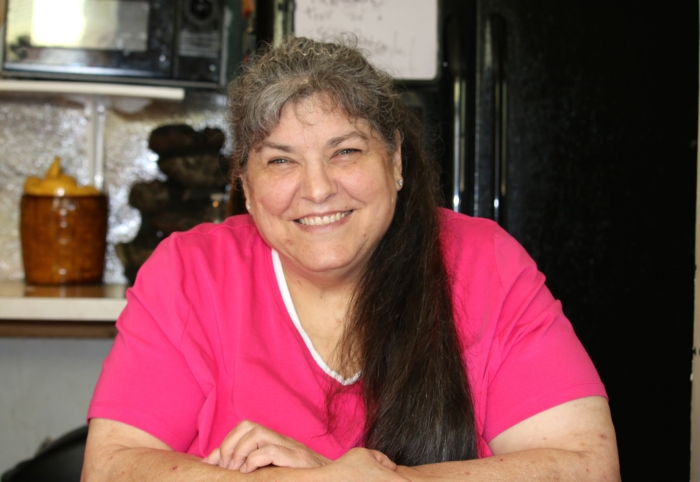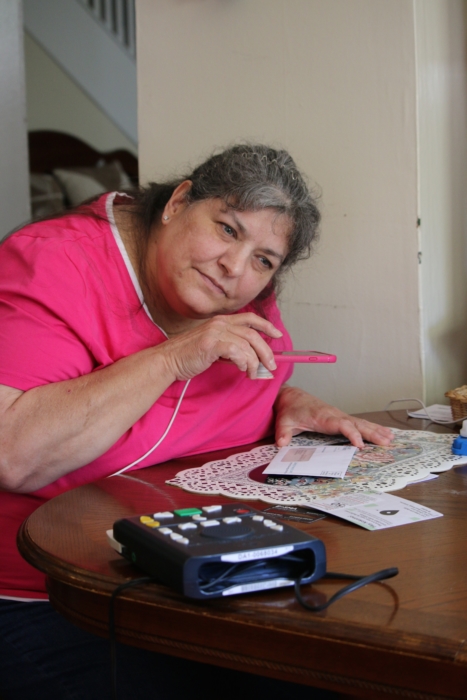
Debbie Bronson was born in Arlington, Virginia. When she was a baby, her mom divorced her dad and moved back to Indiana to be with her family and Debbie never met her father. Her mother raised her in Marion, Indiana out in the country. When she was 3, her mother remarried and her stepfather adopted her. Debbie said, “He was a great man. He was a true father to me.”
Debbie graduated from Oak Hill High School in 1975 and went to Brigham Young University in Utah. After 2 years in college, her mother was killed in a car accident so she moved back home to help her dad with her younger sister who was still in high school at the time. She then got a job at Howard Community Hospital working as a Psychiatric Attendant and she worked there for several years. Debbie said, “I loved it there and learned a lot.”
She then got married and had 2 boys. She worked 70 hours a week and her husband stayed home to take care of their kids, farmland, farm animals, and the housework. She worked at a restaurant as a manager and also taught kindergarten classes. She was married for 26 years. Her marriage had been a very dysfunctional marriage, because her husband was bi-polar and started drinking and using heavy drug. They divorced when her youngest son was 14-years-old.
Twenty-three years ago, Debbie was sitting at a Subway restaurant in the mall with her kids and she couldn’t see the writing on a large marquee sign across the food court with one eye. She made an eye appointment with the local ophthalmologist and they ran a bunch of tests, but they all came back negative. She then went to a retina specialist in Indianapolis who did a field test and could tell she had blind spots mostly in her central vision, but could not determine why she had these blind spots.
Debbie went many years going to different doctors and having different tests performed without being able to get a diagnosis. She started really struggling with her vision at her fast paced job at the restaurant. She had trouble seeing the order tickets. She needed to use a magnifying glass and had to ask them to continually change the printer tape because she needed higher contrast print to see the tickets. She then needed orders written with a Sharpie marker to be able to see them. During this time, she was also going to school to become an RN, which had become her dream. Debbie had completed most of her required course work other than a few classes and her clinical work. When she was required to dissect a cat and could not see well enough to do so, she had to drop out of the program. She then continued to work at the restaurant until it just became too difficult to get around the kitchen due to her failing eyesight and she had to quit.
Due to her declining vision, Debbie applied for Social Security Disability and Vocational Rehabilitation (VR) services. Vocational Rehabilitation is a state agency that assists individuals with disabilities in obtaining or maintaining employment. Vocational Rehabilitation sent her to IU Medical for more testing and when she told the doctor that her vision was really foggy especially in the center he did one test and said he was able to diagnose her. He then diagnosed her with cone-rod dystrophy. It is a genetic eye disorder where vision loss becomes move severe over time. Debbie would later learn that both her mother and father were carriers of the gene and since they were both carriers she inherited the disease.
Vocational Rehabilitation then helped her get a job at the Howard County Home Assisted Living Facility. She started there as a cook. When things started to go downhill for the assisted living agency they fired the director and asked Debbie to manage the facility in the interim. Debbie said she really enjoyed the position, but the paperwork was difficult for her. She wore glasses with a magnifier, but still had to press her nose against the paperwork to see the print. The facility was planning to close because there were fewer and fewer residents. While Debbie was acting as the manager, she got the place running smoothing and filled the facility with residents so they remained open. She stayed there for another year, but her vision continued to get worse and they wanted a full-time live in administrator so she gave up the position.
Now that her vision had declined to the point of not being able to work outside of the home, Debbie received benefits from Vocational Rehabilitation to become a homemaker (Please note: Homemaker is no longer an eligible job goal that can be supported by VR). Through these services, Debbie got Orientation & Mobility training to learn how to use a white cane so she could navigate her environment on her own and was also provided many talking devices that would increase her independence such as voice recorders and a PenFriend. A PenFriend is a voice labeling system that allows a person to record audio labels and then those labels can be attached to any item. The pen can then be used to scan the label to give an audio description of that item so someone who is blind or visually impaired will be able to identify what it is.
While she was learning to live independently with her vision loss, her son purchased her an iPhone and VR referred her to Easterseals Crossroads for an assistive technology evaluation so her technology needs could be assessed and she could be trained on how to use her iPhone. An assistive technology evaluation is a one-on-one evaluation to determine what types of assistive technology are available to increase an individual’s independence at work, school, home, or in the community.
Debbie was assigned to work with Josh Anderson, Clinical Manager of Assistive Technology at Easterseals Crossroads. After he met with Debbie in her home, he recommended a laptop and NVDA screen reader so she would be able to email, communicate with friends and family, and pay bills online. Debbie was able to obtain a free computer from The INDATA Equipment Reutilization program, which provides free computers to individuals who live in the state of Indiana and have a documented disability.
Once a computer became available through that program, Josh delivered it to her and set it up. He then installed the NVDA screen reader, which is a screen reader that enables a blind or visually impaired person to be able to use a computer. The screen reader reads the text that is shown on the computer screen in a computerized voice.
Vocational Rehabilitation paid for Josh to train her on how to use the screen reader functions and how to use several vision apps on her iPhone. During the time they were training, Debbie was running a small dog sitting business in her home and learned how to use the laptop with NVDA so she could create documents for that business. Josh then set up Talking Typing Teacher, which is a program designed for people who are blind or visually impaired to learn typing skills. Debbie said, “I really liked learning how to type using the Talking Typer. After Josh showed me how to use it. I practiced a lot on my own. It was kind of like playing a game.”

During their training sessions, Debbie also learned how to use her iPhone with apps such as the KNFB Reader app, which converts printed materials to text-to-speech. She learned how to use the Scanner Plus app, which enables her to scan documents with her iPhone and once scanned turns them into a .PDF file that can be read by the KNFB Reader app. Together they also set up a printer that she could use to print from her phone.
Around the time Debbie started getting assistive technology training, she and her second husband separated and later divorced. Debbie started getting involved in her church again and learning how to live independently using assistive technology. She started to feel like she could do things on her own now that she had these technologies in place. She said, “I wanted to be independent. I didn’t need to be dependent on anyone. I had learned how to do things on my own. My ex-husband wanted to move to the country and I wanted to stay in our home in the city. We ended up getting a divorce and I bought the house from him and we are still friends today. I am so happy that I stayed here. I’m not isolated out in the country. I can use the bus system in town to do errands and I can continue to run the support group that I started 2 years ago.”
Debbie founded the Wise Owl Support Group for individuals who are blind or visually impaired that meets every 2nd Tuesday of the month at 2pm. Debbie started this support group so people could share resources and provide emotional support to each other. She had been looking for a place to host her support group when she happened to be in the United Way offices in downtown Kokomo and asked if they had a conference room. She said, “It was just meant to be. They had one available at the time I wanted to hold the meeting and the site is accessible from the public bus system, Spirit of Kokomo, which runs 5 days a week from 6am to 6pm.”
Debbie is passionate about the support group and loves to share all of the resources she has learned over the years. She said, “I just couldn’t live with out assistive technology like Siri on my iPhone. Also, my Seeing AI app, which will read my texts, has a bar code scanner for shopping, a color identifier and a money reader. It will describe scenery and also has facial recognition. I also use my PenFriend all the time. I label canned goods, my recipes, and my phone book. I use Siri to read my texts and to add things to my calendar. I use a handheld digital recorder all the time to take notes. I recorded all my trainings with Josh so I could go back and listen to any commands I forgot. It is so handy and all these tools allow me to live on my own.”
Debbie reflected on her training with Josh and said, “I learned so much while working with Josh. I am able to remain living on my own independently by using all the technology he showed me. He was really patient and knowledgeable. He also made learning really fun. It can be frustrating at first, but I always tell everyone to practice, practice, practice with any new technology. It can be hard to overcome the negative feelings you have when it’s new and frustrating, but if you don’t give up and work at it all the time it becomes easier every time you use it. For anyone who is struggling with some task, I would highly encourage you to reach out to Easterseals Crossroads to get the help you need. The tools I have learned through the process are priceless. I am able to live happily on my own and able to share the resources I have learned about with my support group which is open to anyone who wants to join.”
For anyone who is interested in attending, the Wise Owl Support Group meets every 2nd Tuesday of the month at 2pm at The United Way of Howard County at 210 W. Walnut Street Kokomo, Indiana.

Is there a way I could contact Debbie Bronson? I believe I am a relative of hers.